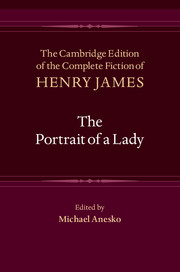Book contents
- Frontmatter
- Contents
- List of Illustrations
- Acknowledgments
- List of Abbreviations
- General Editors’ Preface
- General Chronology of James’s Life and Writings
- Introduction
- Textual Introduction
- Chronology of Composition and Production
- Bibliography
- The Portrait of a Lady
- Glossary of Foreign Words and Phrases
- Notes
- Textual Variants
- Emendations
- Appendices
Chapter 25
Published online by Cambridge University Press: 11 April 2021
- Frontmatter
- Contents
- List of Illustrations
- Acknowledgments
- List of Abbreviations
- General Editors’ Preface
- General Chronology of James’s Life and Writings
- Introduction
- Textual Introduction
- Chronology of Composition and Production
- Bibliography
- The Portrait of a Lady
- Glossary of Foreign Words and Phrases
- Notes
- Textual Variants
- Emendations
- Appendices
Summary
WHILE this sufficiently intimate colloquy (prolonged for some time after we cease to follow it) was going on, Madame Merle and her companion, breaking a silence of some duration, had begun to exchange remarks. They were sitting in an attitude of unexpressed expectancy; an attitude especially marked on the part of the Countess Gemini, who, being of a more nervous temperament than Madame Merle, practised with less success the art of disguising impatience. What these ladies were waiting for would not have been apparent, and was perhaps not very definite to their own minds. Madame Merle waited for Osmond to release their young friend from her tête-à-tête, and the Countess waited because Madame Merle did. The Countess, moreover, by waiting, found the time ripe for saying something discordant; a necessity of which she had been conscious for the last twenty minutes. Her brother wandered with Isabel to the end of the garden, and she followed the pair for a while with her eyes.
“My dear,” she then observed to Madame Merle, “you will excuse me if I don't congratulate you!”
“Very willingly; for I don't in the least know why you should.”
“Haven't you a little plan that you think rather well of?” And the Countess nodded towards the retreating couple.
Madame Merle's eyes took the same direction; then she looked serenely at her neighbour. “You know I never understand you very well,” she answered, smiling.
“No one can understand better than you when you wish. I see that, just now, you don't wish to.”
“You say things to me that no one else does,” said Madame Merle, gravely, but without bitterness.
“You mean things you don't like? Doesn't Osmond sometimes say such things?”
“What your brother says has a point.”
“Yes, a very sharp one sometimes. If you mean that I am not so clever as he, you must not think I shall suffer from your saying it. But it will be much better that you should understand me.”
“Why so?” asked Madame Merle; “what difference will it make?”
“If I don't approve of your plan, you ought to know it in order to appreciate the danger of my interfering with it.”
- Type
- Chapter
- Information
- The Portrait of a Lady , pp. 257 - 262Publisher: Cambridge University PressPrint publication year: 2016

